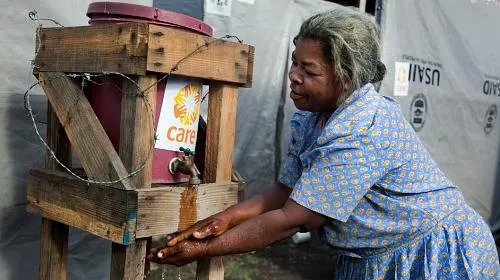(Geneva, March 19, 2020) — As the world faces the unprecedented challenge of the COVID-19 pandemic, international aid organization CARE commits to adapting its programming and scaling up its activities wherever possible. The increase in programming will mainly focus on support for clean water and sanitation services in countries with weak sanitation infrastructure.
“At the moment, the global aid community is not prepared for a major outbreak a COVID-19 in our most precarious humanitarian crises. This is the reality we need to face,” says Sally Austin, CARE International’s Head of Emergency Operations. “We need to do everything we can to support these communities immediately. Now is the time to show solidarity with countries yet to be critically affected and that have insufficient health services to cope with an outbreak of COVID-19. We are calling on international donors to coordinate more closely and make their funding flexible so we can help the world’s most vulnerable people before it is too late.”
CARE Iraq’s Country Director Wendy Barron adds, “In Iraq, many donors have continuously reduced their emergency funding. In the Kurdistan Region of Iraq, CARE is one of only a few remaining aid organizations delivering water and sanitation services to camps and local communities We could scale this up if the health security situation permits, but there is simply not enough funding.”
Access problems for aid workers are worsening the already tense situation in many contexts: “For months we have been facing serious access issues in some of the humanitarian hotspots such as Yemen, Syria or Iraq”, says Austin. “If COVID-19 spreads in those hard-to-reach places, the consequences could be devastating. People here are already weakened by months and years of violence, lack of health services and malnourishment.”
While populations in developed worlds are relying on personal hygiene such as handwashing, disinfecting surfaces and using clean water to drink, to mitigate outbreaks. However, the situation looks vastly different in many parts of the world where tap water and soap are not readily accessible for the majority of the population.
The COVID-19 epidemic doesn’t simply pose a big threat to conflict hotspots as mentioned above. “We are also tremendously worried about big refugee camps such as in Bangladesh or Kenya and not least for local communities in regions that have suffered from chronic poverty and poor health, from Niger to Laos to Papua New Guinea”, continues CARE’s Sally Austin. “I’ve worked on many emergencies in the past 20 years but the scale and speed of the COVID-19 pandemic is unprecedented. We need to be very cautious not to lose sight of the most vulnerable populations.”
CARE is working in 23 countries to increasing water and sanitation support, 14 country teams are scaling up health and reproductive health services and a further 19 countries are working on needs such as income, shelter and education. In other countries, programs have been forced to close as national lockdowns are imposed; which is likely to have a devastating impact on the most vulnerable communities in the days and weeks to come.
“We have a limited period of time in which to act and continue programming before the situation gets really bad and COVID-19 related travel restrictions stop our work. We are already seeing this scenario playing out in many of the most vulnerable countries where we work – it is crucial we act now, before it is too late.”
Please donate to CARE’s COVID-19 Emergency Appeal here.
###
Media contact: Kalei Talwar
Press Officer
email: kalei.talwar@care.org | skype: kalei.talwar
cell: +1 808-381-6901

